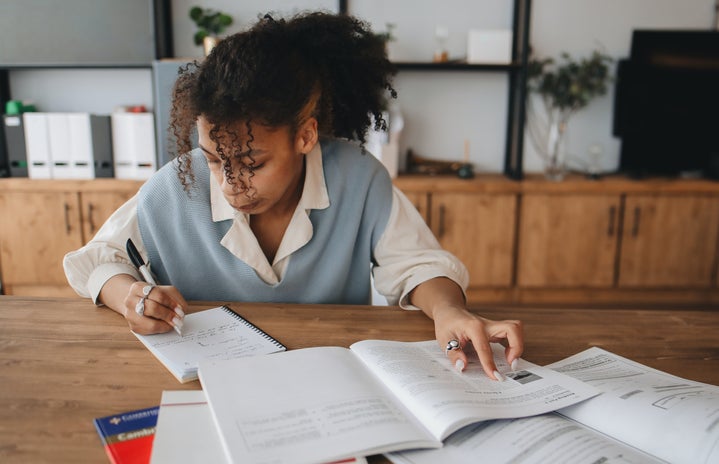The idea of predominantly white institutions (PWIs) was a completely foreign concept to me until I came to college. Now, I obviously knew that not all spaces (schools, communities, institutions etc.) were as ‘white’ as my high school and surrounding neighborhoods. I mean, growing up right next to and spending a good amount of time in southeast DC clearly emphasized that white, homogeneous spaces were not the norm everywhere. But the beginning of college two years ago highlighted how little I actually knew about the impact and importance of your spaces and your identity— especially as a Black woman.
The gist of the whole experience is never being able to fit into the stereotypes of, well, pretty much anything. In high school, I had always been told that I spoke too ‘white’ by my peers, and when I came to my current university — a school with a much more diverse student body — I was told the same. I was told I seemed pretentious because of my academic habits, vocabulary and the way I chose to dress. It seemed that no matter how I did my hair, changed my diction or hid my taste in music, I would never fit this box that was created by others for me.
In reality, none of the things I did made me any more ‘white’ – or any less ‘Black,’ for that matter. Regardless, I was a Black woman who would still feel the same discrimination, inherent racism and negative implications of a white supremacist system. Yet, it felt as though I was in some way not allowed to fully feel the weight of these oppressive systems because I was ‘basically white,’ right? Wrong.
Over time, I learned that the identity crisis that comes from growing up as a Black woman in a PWI setting is extremely normal, and actually accounts for many unfulfilled desires and glaring concerns I had, stemming all the way from my grade school days. Through some therapy, hours of reflection and the power of TikTok, I found a few ways to ground myself in my own identity and hopefully, you can too.
- Acknowledge your situation
-
Up until college, I worked hard to make the scenarios I wanted come to life. Whether it be in academics, my social or family life or extracurriculars, I put everything I could into working hard for what I desired. When some of those opportunities didn’t come to fruition, I consistently blamed myself, even if it was fully out of my control. Starting my freshman year at uni, I realized that some (not all) of the opportunities denied to me were because of my identity, rather than my qualifications or effort.
While this may seem self-explanatory now to many, growing up in a PWI, the idea of equality is presented in a toxic way to Black women. We are told and led to believe that we’re equal to our peers, have the same opportunities and are perceived similarly — that is far from the truth, however.
Taking the time to realize that some of the conflicts and situations I experienced were rooted in racism and a white supremacist system allowed me to stop blaming myself for the circumstances that were out of my control.
- Find what you love and don’t let others invalidate your identity
-
Transitioning out of a PWI to a basically lesser (but still) PWI, I felt a lot of shame around my preferences and choices. From music and TV to hair and style, I felt out of place and ashamed to proudly and simply love the things that I did. The more I reflected and learned about myself, the more I realized that the negative stereotypes some had regarding my preferences were rooted in a singular, uniform stereotype of Black women created by (you guessed it) our country’s white, oppressive system.
The belief that Black women are all the same and did not share any major differences continues to be inaccurate. Finding Black women through TikTok who unapologetically loved themselves and their identities while embracing their Blackness challenged me to let go of my need to have my choices be dictated by these negative stereotypes.
- Do the work: introspection and reflection
-
The quarantine graced to us by this catastrophic, tragic pandemic gave me the time to reflect both inwardly and at my past experiences. This time allowed me to begin to understand the roots of my true identity and the psychological implications certain situations had on my sense of self. I also worked to verbalize these feelings and findings to my close friends and family in order to validate them to myself. Taking the time to unpack years of repressed trauma led to me finding what I truly valued about myself along with a more deep rooted, identity that I no longer feel shame to associate with.
I’m here to say that if you’re starting your journey to finding your true identity after a lifetime of confusion and trauma, it’s not necessarily going to be easy— but at least you won’t be alone. The gratifying and freeing experience that is finally discovering who you truly are is unmatchable.


